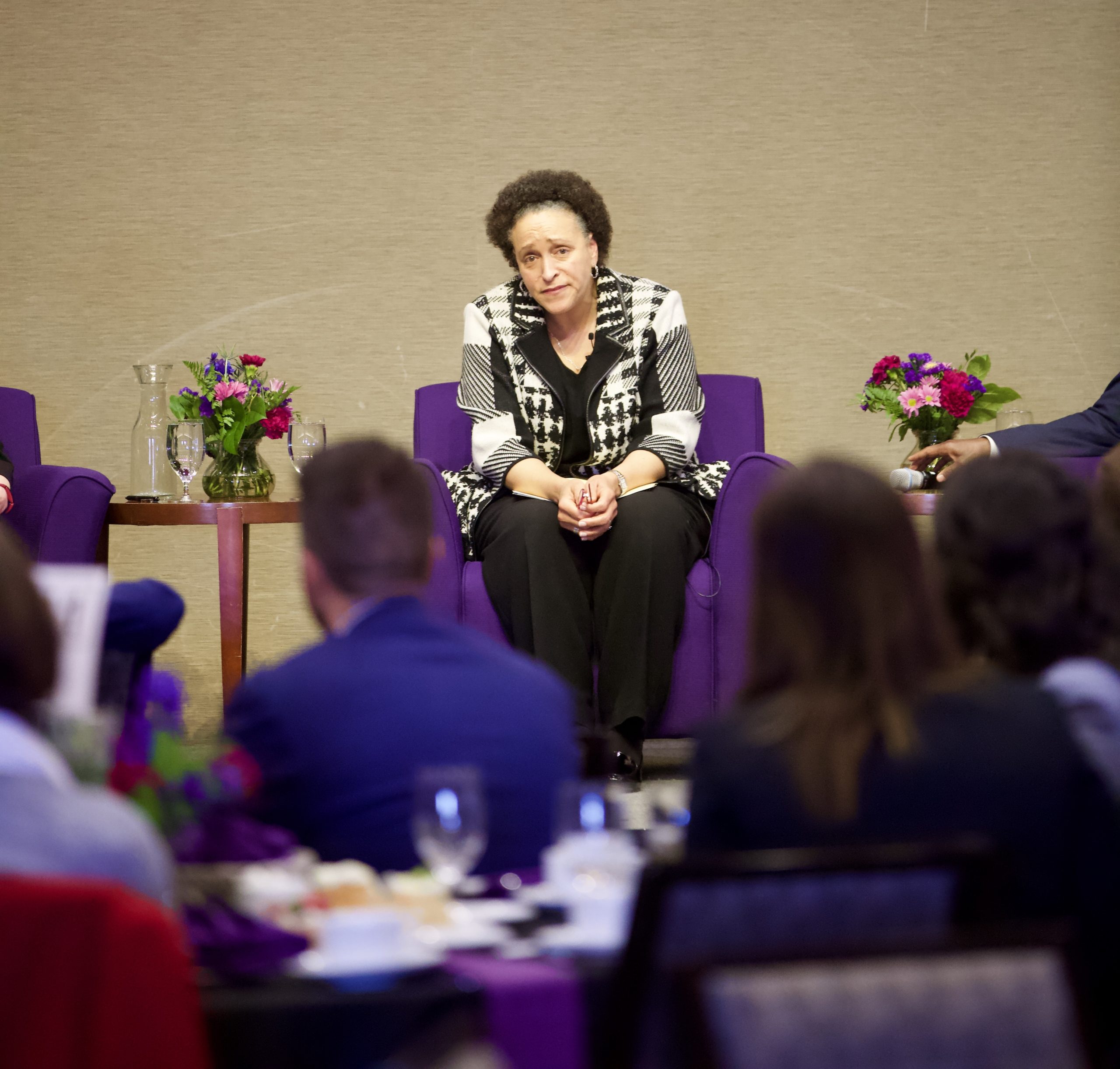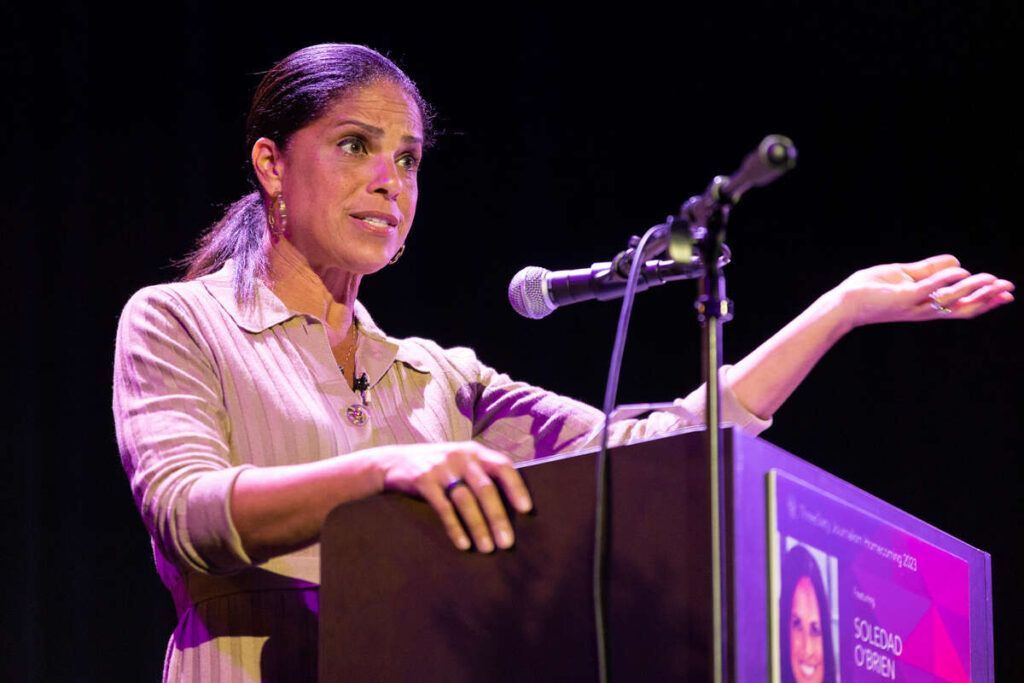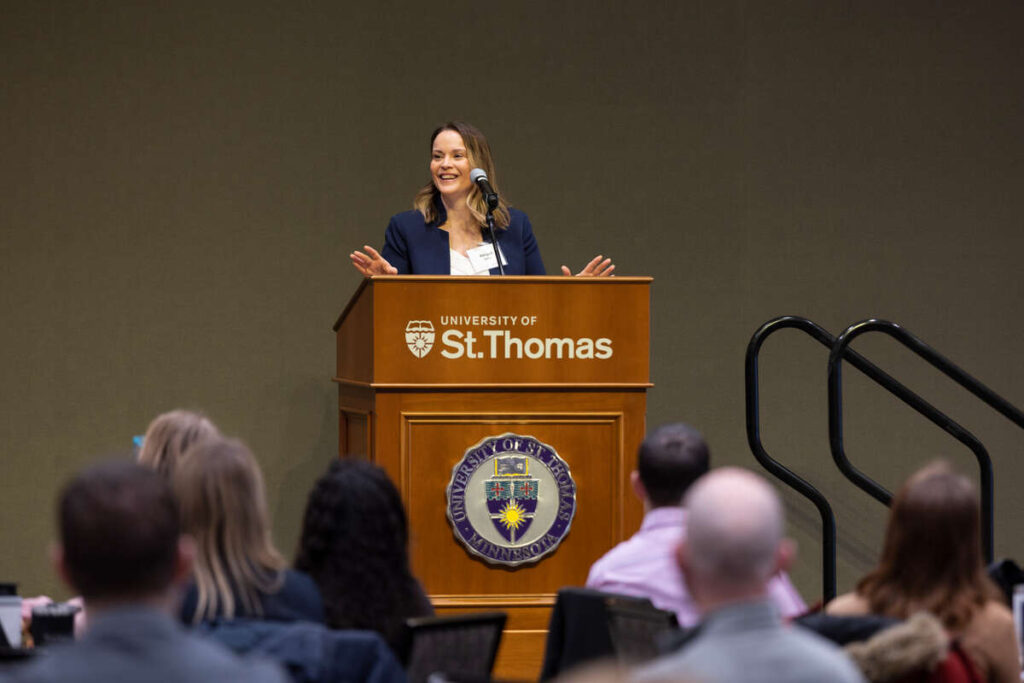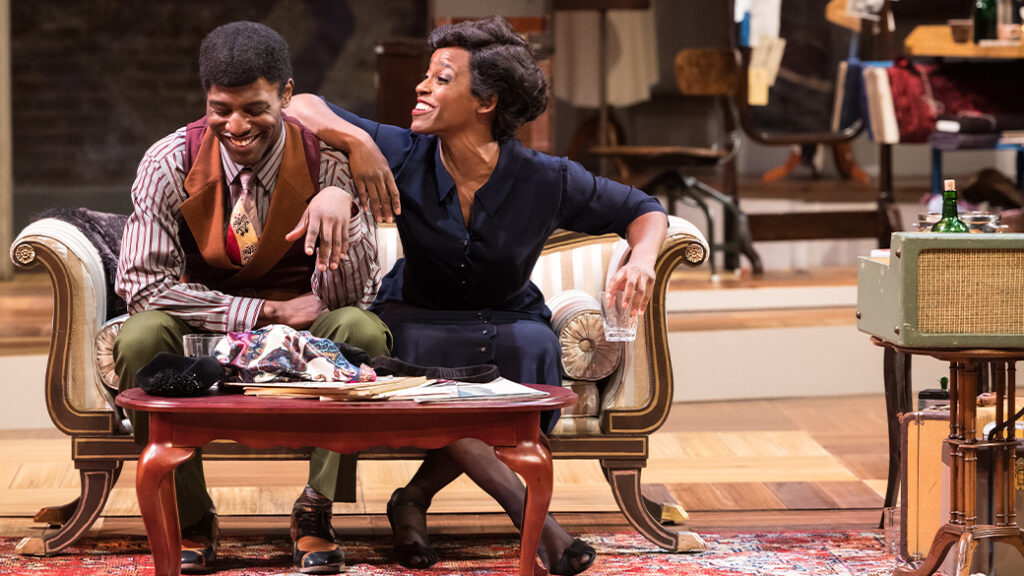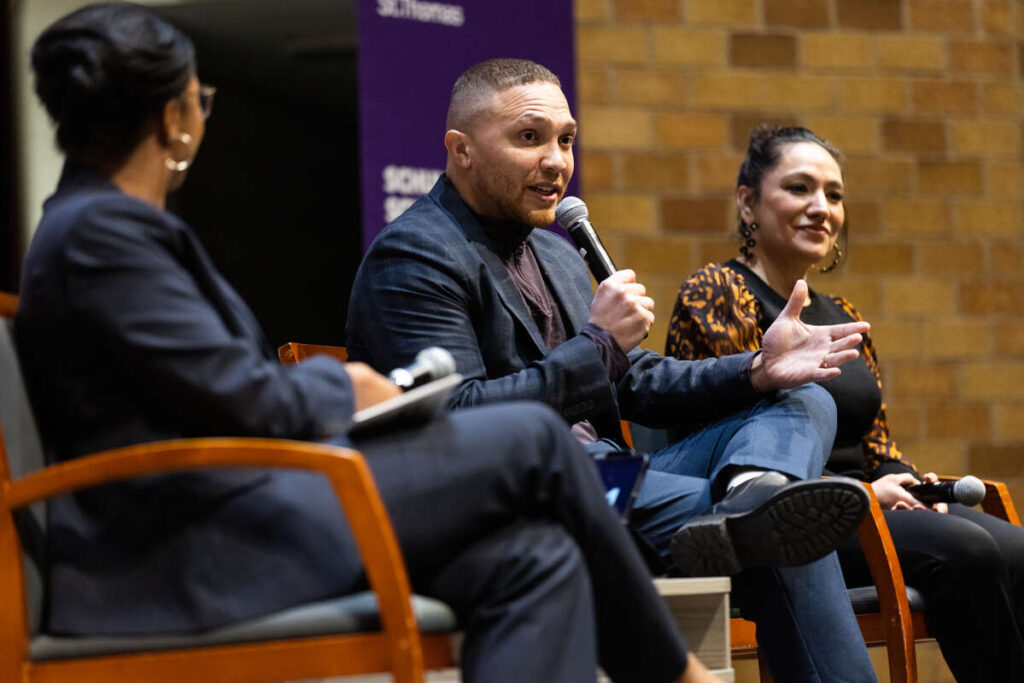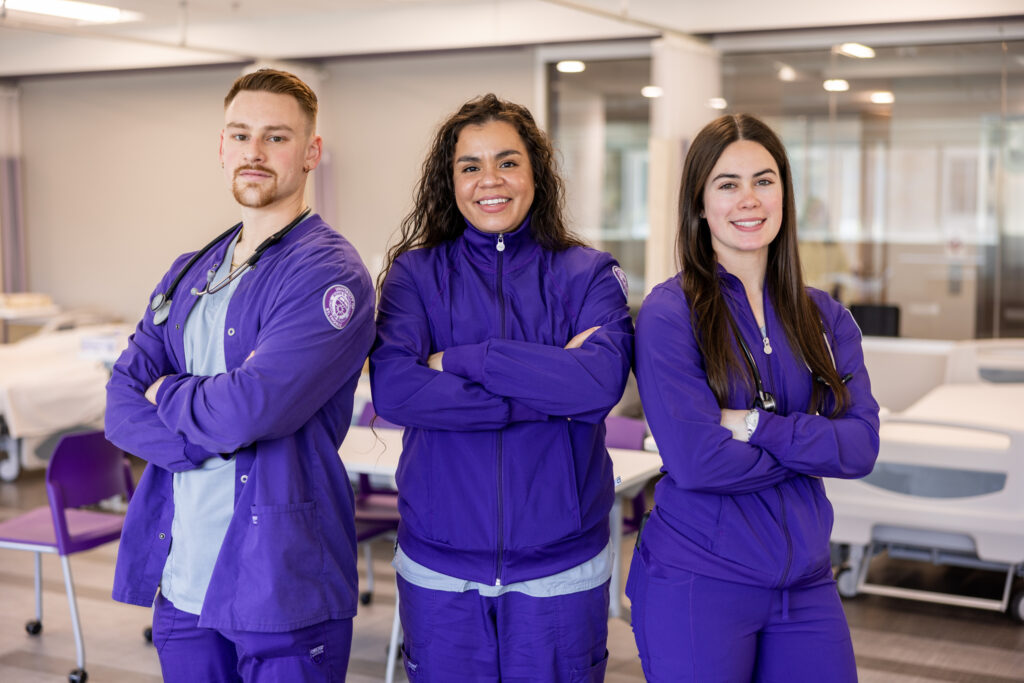To illuminate Women’s History Month on campus, St. Thomas invited a woman who reflects power and strength in many forms. Gaye Adams Massey, CEO of YWCA St. Paul, spoke on March 6 as part of the St. Thomas Alumni Association First Friday Speaker Series on how her organization is setting future generations up for success today by focusing on finding new solutions to pressing issues in the Twin Cities.
Eliminating racism and empowering women are two missions Adams Massey passionately lives out in her line of work by focusing on improving the educational system, her advocacy for equality and her creation of programming which connect disparities, access and opportunities. Here are five observations from the talk.
1. Empowered women can do just about anything.
To begin her speech, Adams Massey shared a quote from anthropologist Margaret Mead: “Never doubt that a small group of thoughtful, committed citizens can change the world. Indeed, it is the only thing that ever has.”
YWCA USA is globally renown as the oldest, largest multicultural women’s organization in the world. The organization has grown to have affiliates in more than 120 countries. “At the heart of our work at YWCA St. Paul are women, girls and their families,” Adams Massey highlighted. Along with the goals of eliminating racism and empowering women, the YWCA thrives on promoting peace, justice, freedom and dignity for all. To open the door to success, the organization assists young females by helping them find employment opportunities, safe housing, and by giving them the tools they need educationally to thrive.
“The YWCA has long been committed to women and girls leading change in social justice, gender equity, and a world without violence or war,” Adams Massey explained in her opening remarks.
2. The missions and histories of the University of St. Thomas and YWCA St. Paul overlap in many ways.
Similar to St. Thomas, YWCA St. Paul is focused on the common good. “Like you, we opened our doors to serve the needs of young people,” she said. While St. Thomas was developing its school to be a haven for young men striving for further education, YWCA St. Paul was supporting young women who were coming to St. Paul to find work from rural areas. In response to the shortage of safe and affordable housing for these young dreamers, YWCA St. Paul worked to offer lodging, a gym, classrooms and a social club for these working women.
“What is especially impressive about this is that this effort was led by women, for women, before women had the right to vote,” she said. By observing changing community needs in the St. Paul area, YWCA St. Paul and St. Thomas each have developed their strategies out of response to these evolving demands. During the Depression, YWCA St. Paul put its attention on job assistance and counseling for those battling to make ends meet; St. Thomas was similarly working to provide support and counseling to their students and struggling Catholic schools.
Moving into the ‘40s, YWCA St. Paul taught key job skills to women in effort to replace the workforce that left for the battlefield during World War II. During this time St. Thomas served as a training base for naval officers.
Both St. Thomas and YWCA St. Paul shifted their mentality to focus on education and recreation. With a joking tone, Adams Massey commented, “I am not sure I can say that you followed our lead, but in the ‘70s, St. Thomas began welcoming women to the school, offering another opportunity for women to grow and advance right here in St. Paul.”
Throughout the ‘80s and ‘90s, both institutions expanded; St. Thomas developed the Minneapolis campus while YWCA St. Paul opened the first emergency shelter for families in Minnesota. Looking at the present, YWCA St. Paul continues to work in areas of social justice, economic opportunity, and social welfare as it grows and expands. YWCA St. Paul and St. Thomas recently collaborated on the SOLV Initiative Mindful Movement project.
3. Sticks in a bundle are unbreakable.
This Kenyan proverb is said often within YWCA St. Paul because of its undeniable truth. Adams Massey unfolded the phrase, saying, “We believe this concept reflects the power of care in communities, the greater strength and impact of working together. The services we offer strengthen each person who comes through our doors, but the true strength comes from the broader community of empowered individuals and families that we are building.”
In effort to strengthen the bond between YWCA St. Paul and the greater community, the organization helps individuals get on the path of self-sufficiency by providing tools such as training for in-demand jobs, case management, conflict management and connections to human resources.
4. Safe and stable housing is foundational to a child's health and success.
“Approximately 16,000 Minnesota kids will experience homelessness. Those are numbers that keep me awake at night. It is estimated that not providing adequate housing for today’s workforce could cost us $215 million annually in job growth and productivity,” Adams Massey explained.
She said that with rent increasing, about 75% of renters are overpaying in our community. School-age children are particularly at risk to homelessness. “These children are our future workforce, our future caregivers, our future neighbors. Making sure they get a stable start is a good investment for all of us,” she said.
The development of YWCA St. Paul’s transitional housing program has advanced safe and stable housing in the Twin Cities. Through this program, families reside in a one- or two-bedroom apartment owned by YWCA St. Paul for up to two years. Tailored to the family’s unique needs, YWCA St. Paul provides support to these families in many ways. Uplifting parents is crucial in resetting the families for success. Additionally, addressing domestic violence and mental health issues is also a key part to the process. “We support their growth as parents able to nurture their children’s health and development. Equally, though, we work with the children,” she said. Supporting their educational achievement, behavior and overall health helps promote their future prosperity as leading citizens of our country. Last year YWCA St. Paul found stable housing in the Twin Cities for 200 families that completed their program.
Adams Massey said that fostering a connection between the people and what you are passionate about is pivotal in developing an organization such as YWCA St. Paul that continues to give generously to the community. “When you understand someone else’s different life experience and challenges they faced, you often find ways to consensus or figure out how you’re going to move forward,” she said.
5. A teaching profession that is paid appropriately and gets training to deal with changing demographics is needed.
In a further correlation between YWCA St. Paul and St. Thomas, Adams Massey discussed how YWCA St. Paul is tackling implicit bias. She said that seeing a person of authority who looks like you is important for students in schools.
College of Arts and Sciences Dean Yohuru Williams chimed in, saying that “diversity, equity and inclusion is work that we all do every day,” citing the changing tuition model and partnering with Catholic schools as examples. The School of Education also has online courses in cultural competency for existing teachers.
